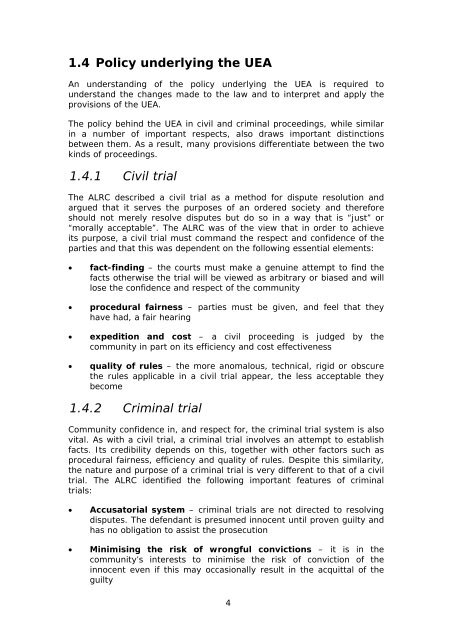Introduction to the UEA - Victorian Law Reform Commission
Introduction to the UEA - Victorian Law Reform Commission
Introduction to the UEA - Victorian Law Reform Commission
You also want an ePaper? Increase the reach of your titles
YUMPU automatically turns print PDFs into web optimized ePapers that Google loves.
1.4 Policy underlying <strong>the</strong> <strong>UEA</strong><br />
An understanding of <strong>the</strong> policy underlying <strong>the</strong> <strong>UEA</strong> is required <strong>to</strong><br />
understand <strong>the</strong> changes made <strong>to</strong> <strong>the</strong> law and <strong>to</strong> interpret and apply <strong>the</strong><br />
provisions of <strong>the</strong> <strong>UEA</strong>.<br />
The policy behind <strong>the</strong> <strong>UEA</strong> in civil and criminal proceedings, while similar<br />
in a number of important respects, also draws important distinctions<br />
between <strong>the</strong>m. As a result, many provisions differentiate between <strong>the</strong> two<br />
kinds of proceedings.<br />
1.4.1 Civil trial<br />
The ALRC described a civil trial as a method for dispute resolution and<br />
argued that it serves <strong>the</strong> purposes of an ordered society and <strong>the</strong>refore<br />
should not merely resolve disputes but do so in a way that is “just” or<br />
“morally acceptable”. The ALRC was of <strong>the</strong> view that in order <strong>to</strong> achieve<br />
its purpose, a civil trial must command <strong>the</strong> respect and confidence of <strong>the</strong><br />
parties and that this was dependent on <strong>the</strong> following essential elements:<br />
• fact-finding – <strong>the</strong> courts must make a genuine attempt <strong>to</strong> find <strong>the</strong><br />
facts o<strong>the</strong>rwise <strong>the</strong> trial will be viewed as arbitrary or biased and will<br />
lose <strong>the</strong> confidence and respect of <strong>the</strong> community<br />
• procedural fairness – parties must be given, and feel that <strong>the</strong>y<br />
have had, a fair hearing<br />
• expedition and cost – a civil proceeding is judged by <strong>the</strong><br />
community in part on its efficiency and cost effectiveness<br />
• quality of rules – <strong>the</strong> more anomalous, technical, rigid or obscure<br />
<strong>the</strong> rules applicable in a civil trial appear, <strong>the</strong> less acceptable <strong>the</strong>y<br />
become<br />
1.4.2 Criminal trial<br />
Community confidence in, and respect for, <strong>the</strong> criminal trial system is also<br />
vital. As with a civil trial, a criminal trial involves an attempt <strong>to</strong> establish<br />
facts. Its credibility depends on this, <strong>to</strong>ge<strong>the</strong>r with o<strong>the</strong>r fac<strong>to</strong>rs such as<br />
procedural fairness, efficiency and quality of rules. Despite this similarity,<br />
<strong>the</strong> nature and purpose of a criminal trial is very different <strong>to</strong> that of a civil<br />
trial. The ALRC identified <strong>the</strong> following important features of criminal<br />
trials:<br />
• Accusa<strong>to</strong>rial system – criminal trials are not directed <strong>to</strong> resolving<br />
disputes. The defendant is presumed innocent until proven guilty and<br />
has no obligation <strong>to</strong> assist <strong>the</strong> prosecution<br />
• Minimising <strong>the</strong> risk of wrongful convictions – it is in <strong>the</strong><br />
community’s interests <strong>to</strong> minimise <strong>the</strong> risk of conviction of <strong>the</strong><br />
innocent even if this may occasionally result in <strong>the</strong> acquittal of <strong>the</strong><br />
guilty<br />
4

















